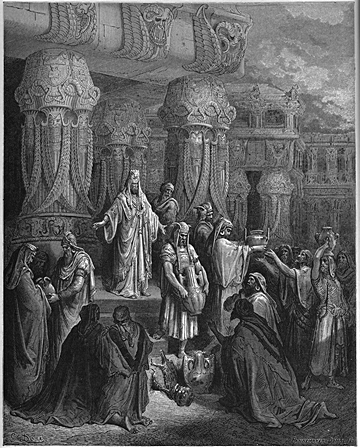Ezra 1
1 Now in the first year of Cyrus king of the Persians, that the word of the Lord by the mouth of Jeremias might be fulfilled, the Lord stirred up the spirit of Cyrus king of the Persians, and he issued a proclamation through all his kingdom, and that in writing, saying,
Pea ko eni, ʻi he ʻuluaki taʻu ʻo Kolesi ko e tuʻi ʻo Peasia, pea koeʻuhi ke fakamoʻoni ai ʻae folofola ʻa Sihova ʻi he ngutu ʻo Selemaia, naʻe ueʻi ʻe Sihova ʻae laumālie ʻo Kolesi ko e tuʻi ʻo Peasia, pea naʻe fanongonongo ʻe ia ʻae fono ʻi hono puleʻanga kotoa pē, pea naʻe tohi ia foki, ʻo pehē,
2 Thus said Cyrus king of the Persians, The Lord God of heaven has given me all the kingdoms of the earth, and he has given me a charge to build him a house in Jerusalem that is in Judea.
ʻOku pehē ʻe Kolesi ko e tuʻi ʻo Peasia, “Kuo tuku kiate au ʻe Sihova ko e ʻOtua ʻoe langi ʻae ngaahi puleʻanga kotoa pē ʻo māmani: pea kuo fekau ʻe ia kiate au ke u langa ʻae fale moʻona ʻi Selūsalema, ʻaia ʻoku ʻi Siuta.
3 Who [is] there among you of all his people? for his God shall be with him, and he shall go up to Jerusalem that is in Judea, and let him build the house of the God of Israel: he [is] the God that is in Jerusalem.
Ko hai ia ʻiate kimoutolu ʻi hono kakai kotoa pē? Ke ʻiate ia ʻa hono ʻOtua, pea ke ʻalu hake ia ki Selūsalema, ʻaia ʻoku ʻi Siuta, pea ke langa ʻae fale kia Sihova ko e ʻOtua ʻo ʻIsileli, (ko ia ia ko e ʻOtua, ) ʻaia ʻoku ʻi Selūsalema.
4 And [let] every [Jew] that is left [go] from every place where he sojourns, and the men of his place shall help him with silver, and gold, and goods, and cattle, together with the voluntary offering for the house of God that is in Jerusalem.
Pea mo ia fulipē ʻoku toe ʻi ha potu ʻaia ʻoku ʻāunofo ia ki ai, tuku ke tokoni ia ʻe he kau tangata ʻo hono potu ʻaki ʻae siliva, pea mo e koula, pea mo e ngaahi koloa pea mo e fanga manu, ko hono fakalahi ia ʻoe ngaahi meʻa ʻoku foaki loto lelei ki he fale ʻoe ʻOtua ʻoku ʻi Selūsalema.”
5 Then the chiefs of the families of Juda and Benjamin arose, and the priests, and the Levites, all whose spirit the Lord stirred up to go up to build the house of the Lord that [is] in Jerusalem.
Pea naʻe toki tuʻu hake ai ʻae kau tuʻukimuʻa ʻi he mātuʻa ʻo Siuta mo Penisimani, mo e kau taulaʻeiki, pea mo e kau Livai, pea mo kinautolu kotoa pē naʻe fakaakeake honau laumālie ʻe he ʻOtua, ke ʻalu hake ke langa ʻae fale ʻo Sihova ʻaia ʻoku ʻi Selūsalema.
6 And all that were round about strengthened their hands with vessels of silver, with gold, with goods, and with cattle, and with presents, besides the voluntary offerings.
Pea naʻe fakamālohi honau nima ʻekinautolu kotoa pē naʻe nonofo fakataha mo kinautolu, ʻaki ʻae ngaahi ipu siliva, mo e koula, mo e ngaahi koloa, mo e fanga manu, pea mo e ngaahi meʻa maʻongoʻonga, ka ʻoku lau kehe ʻae ngaahi meʻa kotoa pē naʻe ʻatu loto ʻofa pe.
7 And king Cyrus brought out the vessels of the house of the Lord, which Nabuchodonosor had brought from Jerusalem, and put in the house of his god.
Pea naʻe fetuku mai foki ʻe Kolesi ko e tuʻi ʻae ngaahi ipu ʻoe fale ʻo Sihova, ʻaia naʻe fetuku ʻe Nepukanesa mei Selūsalema, pea naʻa ne tuku ia ʻi he fale ʻo hono ngaahi ʻotua;
8 And Cyrus king of the Persians brought them out by the hand of Mithradates the treasurer, and he numbered them to Sasabasar, the chief man of Juda.
ʻIo, naʻe ʻomi ia [kotoa pē ]ʻe Kolesi ko e tuʻi ʻo Peasia ʻi he nima ʻo Mitilitati ko e tauhi koloa, pea lau ia kia Sesipasa, ko e ʻeiki ʻo Siuta.
9 And this [is] their number: thirty gold basins, and a thousand silver basins, nine and twenty changes, thirty golden goblets,
Pea ko hono lau eni: ko e ipu lafalafa koula ʻe tolungofulu, mo e ipu lafalafa siliva ʻe taha afe, mo e hele ʻe uofulu ma hiva,
10 and four hundred [and] ten double silver [vessels], and a thousand other vessels.
Ko e ipu luoluo koula ʻe tolungofulu, mo e ipu luoluo siliva ʻoe anga ʻe taha ko e fāngeau mo e hongofulu, pea ko e ngaahi ipu kehe ʻe taha afe.
11 All the gold and silver vessels were five thousand four hundred, [even] all that went up with Sasabasar from the [place of] transportation, from Babylon to Jerusalem.
Ko e ngaahi ipu koula mo e siliva kotoa pē ko e nima afe mo e nimangeau. Naʻe fetuku eni kotoa pē ʻe Sesipasa fakataha mo kinautolu ʻoe kau pōpula ʻaia naʻe ʻohake mei Papilone ki Selūsalema.





















